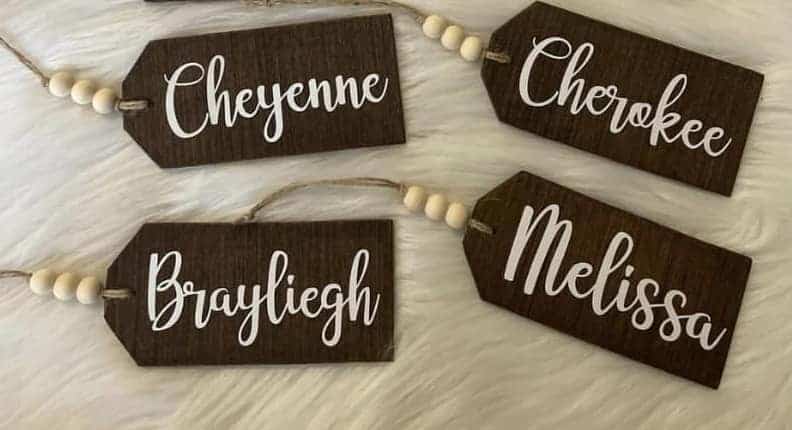
Name appropriation is a subset of cultural appropriation, a topic we want to discuss as a baby naming site.
First, let’s define cultural appropriation. Cultural appropriation is defined as when a member of a dominant culture take elements from a culture of people who have been systematically oppressed by that dominant group. As opposed to cultural appreciation or exchange, appropriation lies in the power dynamic—of one dominant culture who has systematically oppressed, controlled, or even murdered another.
If you are American Caucasian, this probably applies to you. Now before you go “atting” us, or “but…but…butting” please read the rest of this article.
Native American and Hawaiian Names
Name appropriation is most prevalent with white people and Native American/Hawaiian names. I’m not going to go into the long history of how white colonizers massacred the natives (including Hawaiian natives) to steal land and wipe out their culture – even to the point where it was illegal to speak their own indigenous languages or practice their own religions. There are very lengthy histories online where you can inform yourself about these horrors in American history.
But it happened. And then when a white person then thinks it’s “cool” to give their white child a native name, you have to understand how offensive that can be to the Indigenous cultures. Especially if it’s a sacred or tribal name.
But wait, Dakota is a state name – I didn’t even name my baby after the tribe!
As I stated above, no butts! Take a moment from your initial white defense reaction and absorb this idea from the oppressed point of view. Imagine your name is unique, say Thalia Elisandra. You are now an adult and have never met anyone with your unique name. But you are working for the worst boss ever who is highly abusive. He calls you names, makes you work 80 hours a week, then he cuts your pay in half and eventually fires you on the spot, leaving your family without an income. Then you find out on social media that this horrible person gave their child your unique name – Thalia Elisandra. Not after you, but just because he thought it was a “cool name.” It would make you sick to your stomach.
I wouldn’t care. Anyone has the right to name their child whatever they want!
Yes, you would care. You would be enraged. Now add centuries of oppression to that rage.
But what if I just love the culture and want to honor it? Shouldn’t they be flattered?
No. Because names are an integral part of a culture and language. And if you’re not part of that culture – and worse, part of a group that has historically tried to eliminate that culture, language, and names – it’s incredibly insensitive to take a part of it and wear it like a Gucci handbag.
Well then what about Irish names or French names or or or…
Remember, this is about the power dynamic between a dominant culture and the culture that has been historically oppressed and damaged by them. If that power dynamic doesn’t exist, it’s not appropriation.
What if I’m mixed-race and it’s part of my own culture?
If you’re mixed-race and honoring part of your own culture, or your partner is of that culture – it’s not appropriation. The only exception to that is if it’s just hearsay (“my mom told me I was 1/64th Cherokee!”), meaning not verified, or if you have never identified or adopted any other part of that culture in your life prior to having the baby.
So what if I already have given my child a culturally insensitive name? Now what do I do?
At the very minimum, have a discussion with them about their name, when they’re of an age where they can understand colonization and racism. Explain that you were uninformed when you gave them their name, and you want to help them know more about the background of it. Help them research the culture and meaning behind it.
You don’t have to go changing a child’s name, but if you are an expecting parent considering a name that would be highly offensive to one of the cultures we have historically damaged, then we’re just asking you to rethink it, and choose a name that would be less offensive.
On that note, here’s a short list of Native American Tribal names that have become given names that definitely should be avoided if you are of the oppressing race. Yes, even if they’re place names.
- Alabama
- Apache
- Cherokee
- Cheyenne
- Dakota
- Hopi
- Lakota
- Miami
- Mohave
- Mohawk
- Navajo
- Sioux
- Shosone
- Shawnee
- Yuma
- Zuni
and any other Native tribal or given name.
And here is a list of some native Polynesian names that have become popular baby names, that should be avoided if you are of the oppressing race:
- Hana
- Iolani
- Leilani
- Lilo
- Kai
- Kaia
- Kalani
- Kane
- Keanu
- Koa
- Malia*
- Naia
- Nakoa
- Noelani
- and yes, even Moana.
*Malia also exists in several African cultures as well, particularly in Kenya and Nigeria. In Swahili the name Malia has the meaning of “queen,” although it may differ across diverse African tribes and cultures.
Have feedback? Join us on our Facebook page or Facebook Group to politely discuss.
Jennifer Moss (she/her) is the founder of BabyNames.com, author of The Baby Names Workbook, and Producer of The Baby Names Podcast. Jennifer is widely regarded as the leading expert on popular baby name trends and the naming process, serving as the authoritative source on the subject for national and international media.
Jennifer entered the tech arena in the 80s as a software developer and database architect, and became a pioneer in the Internet industry. In addition to operating BabyNames.com, Jennifer owns a web development agency in central California.






